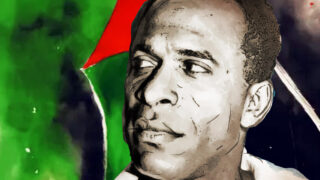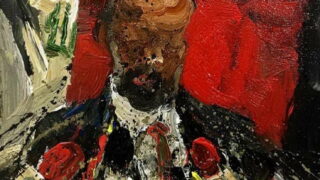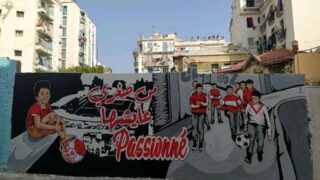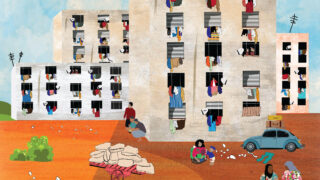After the hostage crisis ended at the In Amenas gas station in the oil fields of Tigantourine — which resulted in massive human casualties — Algerians are asking themselves: Has their country's turn arrived in the game of violent re-division led by Westerners for two decades in the Arab world? Algerians are worried about the political weakness of their authoritarian regime, which may itself be involved in this game in order to save itself, rather than engaging in a process of internal democratic reform that has become "an urgent need for national security."
Since last Monday [Jan. 21], the official death toll of the kidnapping crisis has risen to 23, along with the "purging" of 32 terrorists. This was at the hands of a "multinational" group in the oil fields of Tigantourine. It is feared that this number could increase, in light of information regarding the discovery of 25 unidentified bodies in the oil field in the area of In Amenas, located 100 kilometers from the border with Libya.
While the Algerian authorities have yet to calculate all human losses and the economic impact of this attack — which affects a central sector of the Algerian economy — it raises a number of serious questions: How and why were terrorists able to reach this oil field, which was supposed to be heavily protected? Politically, questions revolve around Algeria's foreign policy and the country's relations with Western powers. The latter have aggressively engaged in wars in order to defend their political and economic supremacy in the face of the Chinese giant.
Where is the gap?
On the "technical" level, most Algerians realize that the attack carried out by the special forces of the Algerian army was inevitable. In their opinion, given the situation, this operation on the part of the Algerian special forces avoided the worst. There were 700 hostages and an oil field in the hands of jihadists. From this perspective, some have interpreted Western criticism regarding the "violent" methods used by the Algerian army as a means of putting pressure on the Algerian government, in order to involve it in other operations currently underway in the Sahel region.
In reality, the Algerian government's operation to free the hostages is not — in and of itself — the topic of debate among Algerians. In the latter's view, the issue is that jihadists were able to take control of an oil field. This is a massive and worrisome security failure because the Algerian government itself was the first to warn of the destabilizing effect that the Western powers' war to oust Gadhafi would have on the country. Meanwhile, the Algerian regime is paralyzed by its most pressing concern, i.e., maintaining its own power and authority through refusing to carry out real democratic reforms, and betting on the extent of its usefulness to Western nations.
The developments in the Sahel region — the breakdown of the Malian army in the north of the country, and the control of insurgents and jihadists over vast areas — were directly linked to the Western war in Libya. Libyan arsenals were opened to Taureg rebel groups and jihadists. Why did these accurate and worrisome analytical readings on the part of Algerian officials not translate into tougher security measures and greater vigilance? Of course, this question has a "technical" aspect: Those guarding the oil field were not armed, thus allowing the jihadists to easily take control. Here arises another "technical" concern: The dangerous situation that has existed for months in the Sahel region, along with the French military intervention in Mali, has only increased the danger. This is compounded by French Foreign Minister Laurent Fabius' announcement that Algeria had authorized "unlimited flyovers" for French military aircraft. This announcement embarrassed the Algerian authorities, who could do without this type of propaganda.
Of course, the nature of the attacks on the Tigantourine oil field implies that it was preceded by a long period of preparation, yet Fabius, through "implicating" the Algerian regime in a public manner, had made Algeria a "certain" target for criticism, whereas previously it had only been a potential target.
Many Algerians were shocked and outraged to learn that French fighter jets were traversing Algerian airspace. Due to Algerians' memories relating to France's "civilizing mission" carried out during the the war of national liberation, they are against the idea of French warplanes returning to Algerian airspace, even if the goal of these flights is to wage war outside Algeria. What further angered Algerians is the fact that they received this news from the French minister, while the Algerian authorities had told them nothing.
The authorities' decision to permit French fighter jets the use of Algerian airspace goes against official Algerian policy, which for months has stressed that any foreign intervention in Mali would have an adverse and destabilizing effect on the nation. Through this announcement, Fabius directly implicated Algeria in the war. To many analysts, the fact that the Algerian authorities have gone back on their previous position and joined the ranks of the war is a distressing sign indicating the "political weakness" of the Algerian regime. Although Algeria's position was correct, given the regime's primary fear — i.e., preserving the current regime instead of carrying out reforms — in the end this position is impossible to defend.
The sequence of events — from the jihadist "attack" in northern Mali (which, from a strategic standpoint is an absurd move, and was used at the appropriate time as justification for a French military intervention that had been in the works for months) and up to the terrorist attack against the Algerian oil field — exposes the weakness of the Algerian state. This weakness is primarily due to the authoritarian nature of the state. Thus, we can abandon the idea that this was a "correct" move, since the Algerian regime, like many other authoritarian Arab regimes, derives a large part of its "legitimacy" from its role as "guardian" of the country, something that contributes to Western interests.
A regime that can be controlled … but a hostile country
For months, Algerian analysts have been following the developments of this major campaign aimed at manipulating spheres of influence in their country. These analysts have expressed their concern regarding the fact that Algeria's policies are ambiguous. These policies are controlled by a president whose work has become limited, even though he is seeking a renewed term. He is hoping to gain Western "approval" for a new presidential term, in exchange for Algeria's participation in ongoing military exercises in the Sahel region.
According to some analysts, this is one of the factors contributing to the political weakness of the Algerian regime. It is a dangerous game that in the end harms Algeria. The situation is only made worse by the weakness of the regime and its rigidity, where officials are not bound by any obligation towards citizens.
For Westerners, Algeria is a paradoxical situation. On the one hand, its susceptibility to manipulation contributes to its weakness, whereas on the other it is a deeply hostile country. In the face of these military exercises, dirty tricks can only be avoided if the national political regime reconciles with the people.
Journalist Lina Azizi provides an accurate description of the situation: "Political scientists are well aware of this fact. A state in which institutions are merely a facade, and the government is not concerned with the condition of the people who shoulder the burden of responsibilities, will be faced with serious demands. Those with technical qualifications are waiting for the green light from politicians — who are not present in the first place — while any real political decision only exists within a very narrow framework … herein lies the main problem. The absence of a real political life, where national issues are discussed in a serious manner, has become a very serious problem. Democratic reform is no longer a luxury, but rather a necessity in terms of national security. This is the tragic lesson we learned from the In Amenas oil field. In the view of the Algerian people, this incident falls on the regime. There is the danger that this could become a breaking point if we allow ourselves to get involved in the games of others."
In a similar context, an editorial in the daily Oran newspaper notes important questions that have arisen in Algeria: “Which interests should we defend? Does the nature of our institutions — including their democratic character and effectiveness — allow us to defend our country in an autonomous way in light of the complex atmosphere? We are fighting to protect our own interests without become agents or participants in the game of repartition planned from abroad, which serves interests that are not our own.”
In response to this editorial, veteran communist Al-Sadiq Hjeris notes: "This failure is often overshadowed by Algeria's comprehensive strategy, which is paralyzed by original sin and the fact that, since independence, it has been missing one of the primarily components or pillars — i.e., consensus, cohesion and national support. This comprehensive strategy stipulates, at a minimum, democratic reform and public participation in approaches that involve the fate of the nation. Despite all of the obstacles, this factor constitutes the key to a victorious struggle for independence." These are the tough questions posed by these incidents resulting from a lack of stability.
Translated by Al-Monitor




